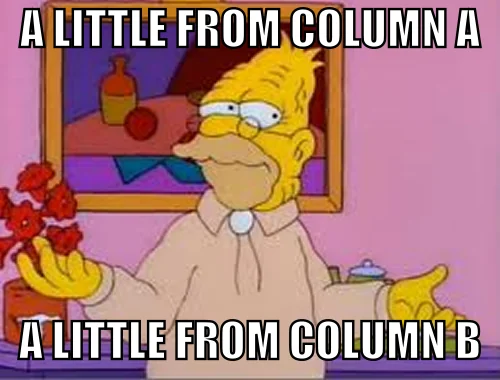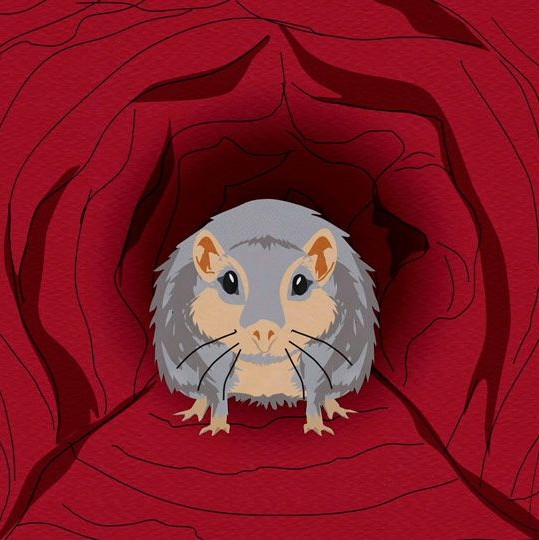I was gonna include a third option about how money is easier to achieve without considering the morality of your actions but that’s not really a philosophy as much as it is an objective fact.
Yes
/thread
In this world, money is power, and power absolutely does corrupt people.
I’ve seen a lot a fair amount of people that started off with humble beginnings, got really popular, made a ton of money, and turned into shitbags as a result because they can just fork up a bunch of cash to make problems go away.
Money and power enables you to get away with immoral stuff, if not straight up illegal.
Both. Money attracts corrupt individuals, but it also causes people to become corrupted in some scenarios. It can be a gradual thing, and it doesn’t always have to be drastic things like a black market kidney. Having money opens up options, some of which are more corrupt.
The weird thing is that people still believe in the trickle-down effect.
Musk is due to become the world’s first recognised trillionaire. Putin was probably the first.
Very rich people are not philanthropic in any way that is noticeable.
I would say “meaningful”. Billionaires can have a very noticeable effect with their philanthropy, while making essentially no sacrifice on their part. The Gates Foundation does very noticeable good, but Bill Gates isn’t giving of himself very much.
Their harm is hidden and any benefits sung from the roof tops.
Yup.
OPs point stands, though, because we could still do that without Gates, and for every Gates there’s a Musk that does evil and a ton of Arnaults and Bezos’s that just spend it on whatever.
So what exactly would you propose he should do?
You invite my “billionaires shouldn’t exist” TED talk.
So what exactly would you propose he would do?
Some of the royal families in the Gulf are also thought to be trillionaires.
My bad. Can imagine that too.
I mean, given that it’s all speculation that’s not really a mistake. I just thought it might be good to mention.
Money doesn’t corrupt people; it’s more like a truth serum for the morally flexible. It’s not that money changes people; it just gives them a megaphone to broadcast their inner used car salesman.
Suddenly, those “creative accounting” skills you never knew you had emerge faster than a politician’s promises during election season. It’s like money has a magical power to turn “I would never” into “Well, just this once” quicker than you can say “offshore account.”
No one is perfect, and money reflects the not perfect side very well in many!
The Mode of Production determines what ideas and traits are more expressed among society. The Base determines the Superstructure, which in turn reinforces the Base.
Ok yes but this makes no sense to someone with zero background in marxist theory.

This is what is being referenced ^
This means that the values of a society are determined by the economic structure but also that these values then reinforce that structure. So you end up with societal values that closely allign with whatever best reinforces the base. In the case of capitalism that is typically greed. So no, money alone doesn’t corrupt people or make them greedy but the economic system that money facilitates does.
Correct me if I am wrong about anything 👍
Fantastic elaboration, comrade, that’s exactly what I am saying.
Not really sure. Somebody wire me an obscene amount of money and I’ll report back. Probably.

This is the wrong question in my opinion. What is being corrupted? One’s morals and ethics? The purity of the human soul? What is the nature of the corruption? Any time we start thinking about “purity” and “corruption” we are moving in dangerous ontological territory.
What is money? Well, it is a stand in for value. Then what is value? Where does it come from? Value comes from exchanging commodities in the marketplace. These commodities are created with human labor power, in other words, value is the crystalized time+energy that it takes on average to produce commodities. New value is created when a commodity costs less to produce than it can be sold for in the market.
In our current historical mode of production, capitalism, the labor that is used to mass produce a commodity is socialized, which means instead of a single craftsperson creating a commodity from start to finish, the production process is broken down and simplified so that it takes many workers to mass produce commodities, each worker specializing in their part of the production process, with the assistance of machines to speed up or simplify this process in order to be more productive.
In contrast, even though the production process has been socialized for the first time in human history, which was in it’s time a progressive if cruel human advancement, the fruits of that production are privatized meaning that goods become the private property of the legal “owner” of the productive apparatus, who can sell those commodities to market for more than they paid to produce them, producing profit from the perspective of the capitalist, or surplus value from the perspective of the workers.
This creates distinct classes which is where we will interrogate the effect of money on the human spirit. There are the owners of capital, who have commodities to sell at the market and workers who have little or nothing to sell but their labor to the capitalist in a labor market. This can be taken even further: there are large capitalists who own a great deal of capital and exploit many workers, small capitalists who own a small among of capital and exploit a few workers (or maybe they even self-exploit,) intellectual or specialized labor that is able to demand higher value in the labor market, and simple or unspecialized labor who’s labor can be easily replaced. A side effect of this creates another class: the unemployed or marginally employed reserve surplus population which can be used to threaten simple laborers with replacement hence driving down the cost of labor and increasing profits for the capitalist. The larger this reserve population, the lower wages can be made, and vice-versa.
Every atomized member of society is then thrown into competition with each other, with a very real threat of losing their class position, with the possibility of being thrown into the reserve population unable to find meaningful work that can support themselves and their family. A large firm can be gobbled up by a larger firm, and its specialized workers eliminated due to “redundancies”. A specializrd worker can be replaced by another unspecialized worker who has the qualifications to do their job or some technological advancement transforms that role into unspecialized or less-specialized labor.
This competitive drive forces individuals to do whatever they can to maintain or increase their class position. If company A refuses to pollute the rivers for increased profit, but company B is willing to, this makes company B more profitable, forcing company A out of business, or acquired by company B; unless the board of directors of company A (pressured by gains-seeking investors) replaces the individual demurring eco-conscious executives with people who are willing to pollute for profit; unless some outside political force steps in to regulate the entire market, creating the necessity of a governing state to manage the market and resources, lest the whole system collapse into complete anarchy. Individual workers must remain “productive” such that they continue to create profit for their capitalists or risk replacement themselves, although they can always be replaced by technological advancements or monopolizing forces as discussed above. The reserve surplus population competes for their very survival or risks starvation, homelessness and death.
So now we have uncovered the forces that cause the “corruption” of money. There is a whole other thread we could pursue here that shows how this system abstracts things like “polluting a river” into numbers on a balance sheet, hiding these forces from anyone who might observe them, and lending a plausible deniability to anyone who would be responsible and hide the real lives of anyone who would be affected. I’ll call this process objectification, which is a huge topic unto itself.
But in my opinion, what this system corrupts is the natural inclination for most people to cooperate with one another, and work creatively. When i recognizes that another person has subjective experience like me, I’ll become more likely to identify and then help them if they need it, as I can relate my own experience to theirs. Our system creates cooperation through competition, since the drive of all productive relations is to pursue profit, the mechanisms of which I’ve already described. There is a constant objectification of the outside world as a function of this pursuit for profit and others which dehumanizes and keeps us in our little competitive consuming silos.
Tldr: does money corrupt? Yes, but it doesn’t corrupt the individual so much as it corrupts the entire social superstructure that is inherent to a functioning society in which people can thrive and self actualize.
Edit: just one note on “objective fact”. Object/subject duality is only one way to look at things, and in fact separating them out like this is a form of “corruption” in that it hides certain truths and leads to certain conclusions. While this has contributed to the development of many kinds of human scientific and technological advancement, we must also understand that all things concerning humans and their experiences need to be understood by unifying subject and object. Pure objectivity is as incomplete as pure subjectivity and while both are useful to increase our understanding we have to put the pieces back together to see the whole picture.
Most things emerge from complex systems.
“A causes B” or “B causes A” sounds tidy, but obscures the reality.
Even in a complex system, though, if something doesn’t happen continuously it’s bound to have characteristic conditions that precede it. Describing it as cause and effect is a function of language, then.
I don’t think money itself corrupts, but power does and power comes with money. Im currently reading a book “Human Kind” that argues that people are generally pretty decent, but that even a little bit of power almost always starts changing people’s behaviour, affecting their empathy, etc.
Personally, I hate having power over others or being in a position of authority. I even feel weird telling my own children what to do.
For every asshole billionaire there’s at least one millionaire you’ve never heard of, giving money away and never trying to have too much to themselves. At least, I’d like to believe that.
“Momma said there’s only so much fortune a man really needs and the rest is just for showing off.”
Corrupt people will be attracted to money.
A lot of otherwise honest people will become corrupt if they see others being corrupt and getting away with money and prestige from it.
A few percent of people will never be corrupted.
I’d say it’s this entirely. Honest people don’t seek money, but if they see their peers getting grapes instead of cucumbers for literally no just cause, then that injustice cannot go unanswered unless they get their grapes too.
I’ve heard the maxim that money doesn’t change who you are, but it amplifies. I think that tends to be true. However, the people you are exposed to in light of that money I think definitely can change who you are.
So yes, money can lead to corruption, but generally it’s in an indirect way.
Source: trust me, bro.
I firmly believe greed comes from two thought processes: A sense of fear, or a desire for authority. I don’t know if wealth will make you a monster, but it will certainly show what you really are.












